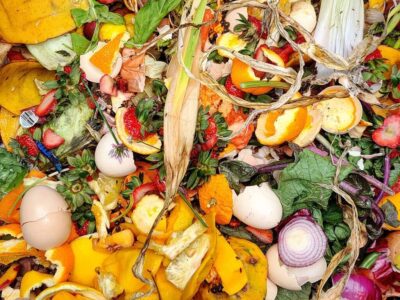
Riyana Razalee (’20 SPS, Sustainability Management) is building from the ground up a career in agriculture and food systems. Riyana spent six years in one of Southeast Asia’s largest banking groups, where she co-led the development of the company’s first-ever sustainable finance framework. Previously she was special officer to the Group CEO of CIMB Group, and also has experience in business strategy and private equity. Riyana holds a Bachelor Arts in political science from the University of Melbourne, Australia.
Columbia’s Sustainability Management (SUMA) program attracted Riyana because of its holistic approach to sustainability, which she is now leveraging as an intern at a Manhattan-based urban food waste company, as well as a fellow at the Tamer Center for Social Enterprise.
What is your work as a fellow with the Tamer Center and what are the responsibilities associated with this opportunity?
I’m immensely grateful to have been selected as a Tamer Center Social Enterprise Summer Fellow. This fellowship will provided me with the ample support necessary for my position throughout summer as a research and strategy intern at Re-Nuble, a Manhattan-based urban food waste company focused on creating closed-loop systems that transform food waste into chemical-free and organic agriculture input.
By developing and analyzing food waste recycling strategies and tools, this opportunity will allow me to help Re-Nuble develop a long-term growth strategy that will lead to successful business commercialization, as well as scaling up and market entry opportunities.
Do your current responsibilities align with the professional goals that you originally had when you began the SUMA program? How?
I began the SUMA program with a very clear plan: Explore as many industries as possible to understand what really makes me tick. After reflecting on past experiences, making full use of SUMA’s resources and courses, speaking to reps from multiple industries, and expanding my understanding of sustainability through the unlimited number of conferences and events here in New York City, I began to carve out a very definitive goal: To regenerate our food systems and in the process, reconnect our communities with it.
I believe that my current responsibilities align perfectly with this goal because food should never be considered “waste,” and the ability to possibly change the narrative is extremely exciting.
What inspired you to work in sustainability? Since when have you worked in sustainability?
I like to think that the roots of my sustainability journey were set when I was still a young girl, having taken part in a number of environment-themed youth conferences which really left a positive impact on me. Unfortunately, as much as I loved it, I never thought that protecting the environment and corporate life could live side-by-side.
Fast forward to 25 years later and I found myself in finance, where I had my lightbulb moment: A beautiful rainforest close to my home that I frequented (which also had been gazetted as a green lung for my city) was going to be destroyed to make space for the construction of luxury apartments. I was extremely vocal about this issue, but also began to notice the strong correlation between environmental issues and finance. My former boss then invited me to co-lead the development of our company’s first-ever sustainable finance framework. I didn’t hesitate to say yes, and I’m proud to say that we successfully laid the foundation for what is now one of the company’s Southeast Asian-wide strategic pillars. I haven’t turned back since then.
What has been the biggest challenge associated with sustainability in this opportunity?
With the industry moving at such a fast pace, understanding what technologies are actually feasible for large-scale impact is something that will be interesting to watch. But in my perspective, more importantly, introducing technology that regenerates our agriculture and food systems, versus disconnecting people from it, is going to be key. The ultimate measure of this impact will be to see if all members of a community are enjoying the benefits that come from these innovative ideas without having to pay a hefty premium to access it.
What skills has the SUMA program taught you that you think have proven useful for this summer fellows?
The exposure to a wide range of courses, whether science-based, technical, or finance-focused, has provided me with a holistic set of tools and perspectives that I hope to bring to the table for this internship and fellowship. Also, the appreciation and ability to apply all three of those “sets” of tools simultaneously is something that I’ve really found useful.
What has been your favorite class (or what were your favorite three classes) in the SUMA program and why?
The Greenhouse Gas Emissions class with Jonathan Dickinson was definitely one of my favorite classes. Not only did I get to work with a real-life client for our final project, therefore cementing tangible skills that I’m hoping to apply during my internship, but I also realized that my understanding of GHG emissions had actually been very limited prior to this class. Jonathan was also an extremely engaging professor who was always ready to answer any of our questions.
I also thoroughly enjoyed the Business of Forestry class with Ralph Schmidt. His passion for forests was something I looked forward to each week. Adding to that, we got the chance to carry out a mock forest valuation with actual foresters at the Rockefeller State Park which was one of the highlights of my time here at SUMA.
Another one which really impacted me was Stephanie Johnston’s Circular Economy class. I always left that class inspired to see what else was happening in the world of closed-loop systems and it made me think about its potential to change the way the world works in the future — little did I know I’d then intern at a company that’s pushing for closed-loop systems. That’s the beauty of the SUMA classes. You never know which one will suddenly come in handy!
What tips do you have for your fellow students who are looking for a job in sustainability?
Firstly, I think there’s value in being really honest with ourselves about our end goal, while also still being flexible, because the world of sustainability is moving extremely fast — what we think we may want to do now could change in the span of just a year, purely because the industry has moved.
While doing this introspective work, talk to as many people as possible, even those who are in industries outside of our interest area. What quickly becomes clear is how interlinked all of the industries are when it comes to our journey towards sustainability. There’s so much value in knowing what’s happening in other industries and something that prospective employers will appreciate.
What do you think is the most beneficial aspect of the SUMA program with regard to your career trajectory?
Hands-down, what I’ve benefited the most from is the diversity of this program. For example, my classmates have brought with them a multitude of work and life experiences and I’ve definitely relied on many of them for guidance as I change my career trajectory. Additionally, the wide, holistic range of classes under the SUMA program, as well as the opportunity to cross-register across Columbia’s various schools has given me the flexibility to truly hone in on the skills that I need and want moving forward. Furthermore, the access I’ve gotten to our professors, who despite being industry leaders in their respective fields, are still willing to assist with career-related questions has proven to be invaluable.
I honestly foresee this program producing some of the biggest sustainability change-makers and leaders, and knowing that I was able to learn side-by-side with them is something I’m sure I’ll look back on and think, “Wow, that was really cool!”
The M.S. in Sustainability Management, co-sponsored by the Earth Institute and Columbia’s School of Professional Studies, trains students to tackle complex and pressing environmental and managerial challenges. Visit the website to learn more.



